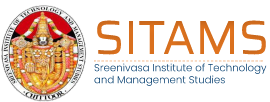III CELL | IIC | NSS & YRC | ICT INFRASTRUCTURE | LIBRARY | ED CELL | STUDENTS CLUB | NEWS LETTER | ALUMNI | SPORTS | APPROVALS | ACTIVITIES
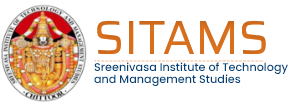
Autonomous Approved by AICTE, New Delhi. Affiliated to JNTUA, Anantapuramu.
COUNCELLING CODE: SSCC


About the Department

Program
 Electronics and Communication Engineering
Electronics and Communication Engineering

Infrastructure

Admissions
 Autonomous Institute
Autonomous Institute Affiliated to JNTUA, Ananthapuramu
Affiliated to JNTUA, Ananthapuramu Accredited by NAAC
Accredited by NAAC
About the Department
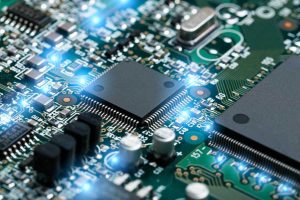

Welcome to the Department of Electronics and Communication Engineering, SITAMS. Our department is dedicated to exploring and advancing the fascinating field of electronics and communication. We are committed to nurturing skilled engineers who will shape the future of technology.
The ECE Department at SITAMS has been a great reputation of excellence in teaching, research and service. The Department of Electronics and Communication Engineering was established in the year 1998 with an intake of 40, and was increased to 60 in the year 1999,120 in the year of 2002 subsequently to 180 in the year of 2012 respectively, besides admission under lateral entry scheme. With excellent laboratory facilities and dedicated faculty, the department of ECE offers broad range of programs that include undergraduate (B.Tech) and post graduate (M.Tech) in VLSI System design programs.
In our department, we offer comprehensive programs and courses that provide a strong foundation in electronic systems, communication networks, signal processing, embedded systems, and more. Our curriculum is designed to equip students with the theoretical knowledge and practical skills necessary to excel in this rapidly evolving field.
Our experienced faculty members are passionate about imparting knowledge and fostering innovation. Through a blend of classroom instruction, hands-on laboratory work, and industry collaborations, we strive to create a stimulating learning environment that encourages critical thinking, problem-solving, and creativity.
The Department is periodically reviewed and all have received continuous and ongoing accreditation from the National Board of Accreditation The UG course was accredited by NBA in 2008, 2013, 2019 and 2022 for 3, 2, 3 and 3 years respectively.
M.Tech (VLSI TECHNOLOGY):
VLSI TECHNOLOGY is a two year full time post-graduate program started in the year 2006 approved by the All India Council of Technical Education(AICTE) . The department offers full time M.Tech program in VLSI technology with an Intake of 9, Selected through GATE/ AP PGECET. VLSI design involves intricate circuitry, layout, and fabrication techniques, optimizing performance, power consumption, and reliability of integrated circuits. As technology continues to advance, VLSI plays a crucial role in driving innovation and pushing the boundaries of electronic devices, opening up possibilities for artificial intelligence, Internet of Things (IoT), and emerging technologies.
Department Goals:
- To enable students to understand, formulate, analyse, and solve complex engineering problems in the field of electronics and communication.
- To impart industry-specific education to students to help them get core jobs in interdisciplinary or multidisciplinary fields.
- To create curiosity and passion in young minds about the fundamental concepts of electricity and electronics and their applications in modern machines.
- To engage students in learning and self-development activities by hosting national and international seminars.
- To teach students a multidisciplinary approach and help them utilize the knowledge of other departments for the field.
- To expand the capabilities of the existing research centre in the department.
- To encourage and empower students to take up entrepreneurship in the field and allied disciplines
VISION & MISSION

PEO’s, PSO’s & PO’s IMAGE
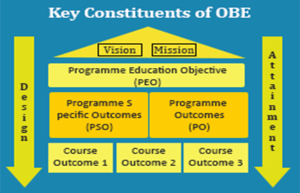
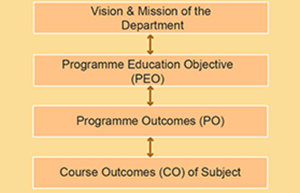
NBA ACCREDIATION
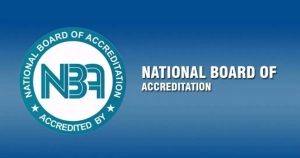
The National Board of Accreditation (NBA) is a prestigious organization committed to promoting quality assurance in higher education in India. Established with the vision of enhancing the quality of technical education and fostering continuous improvement, NBA plays a pivotal role in evaluating and accrediting engineering and management programs across the country.
As an autonomous body under the All India Council for Technical Education (AICTE), NBA employs a rigorous accreditation process that involves thorough assessment and evaluation of various aspects of academic programs. These include curriculum design, teaching-learning processes, infrastructure, faculty qualifications, student outcomes, and industry interactions. Accreditation by NBA signifies adherence to high standards of education and assures stakeholders of the quality and relevance of the accredited program.
The Department is periodically reviewed and all have received continuous and ongoing accreditation from the National Board of Accreditation The UG course was accredited by NBA in 2008, 2013, 2019 and 2022 for 3, 2, 3 and 3 years respectively.
The details of the NBA accreditation status and the programs accredited are as follows:
| S.No | Program | Department | First NBA Visit | Second NBA Visit | Third NBA Visit | Fourth NBA Visit |
|---|---|---|---|---|---|---|
| 1 | UG Programs in Engineering (B.Tech) | Electronics and Communication Engineering | 3 years 2008 – 2011 Approval Letter | 2 years 2013 – 2015 Approval Letter | 3 years 2019 – 2022 Approval Letter | 3 years 2022 – 2025 Approval Letter |
DQIAC (DEPARTMENTAL QUALITY IMPROVEMENT ASSESSMENT COMMITTEE) 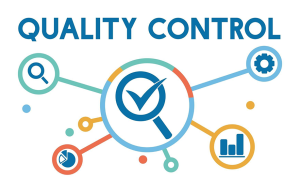

The departmental academic committee is responsible for smooth functioning and monitoring of all academic activities.. The DQIAC is composed of members from Department of Electronics and Communication.
The composition of the DQIAC is as follows:
| S.No | Name of the faculty Member | Designation & Role |
|---|---|---|
| 1 | Dr.M.Saravanan | Professor & Dean academics, SITAMS |
| 2 | Dr.K.Gopi | Professor & HOD,Chairman- DAQIC, Department of ECE,SITAMS |
| 3 | Prof.R.Mynuddin Sulthani | Professor (Member) ,Department of ECE,SITAMS |
| 4 | Dr.P.Sudheer | Professor(Member).Department of ECE,STIAMS |
| 5 | Dr.S.Vijaya kumar | Coordinator, Department of ECE,SITAMS |
| 6 | Dr.C.Kavitha | Associate professor( Member),Department of ECE,SITAMS |
| 7 | Dr.S.Sugumaran | Associate professor (Member),Department of ECE,SITAMS |
| 8 | Mr.K.Yogaprasad | Associate professor(Member),Department of ECE,SITAMS |
| 9 | Ms.V.G.Hamsaveni | Associate professor(Member),Department of ECE,SITAMS |
| 10 | Mr.K.M.Hemambaran | Assistant professor(Member),Department of ECE,SITAMS |
| 11 | Ms.Anitha | Assistant professor(Member),Department of ECE,SITAMS |
Composition
Members to the DAQIC (UG and PG) will be opted covering each specialization of the department. DAQIC/CDC on specific occasions such as making the syllabus for new courses, updating / modifying of present syllabus etc. The composition of the DAQIC shall need approval of the Principal.
Functionalities of DAQIC
Review and analyses on the gap between curriculum and Industry requirement and gives necessary feedback or advice actions.
Roles & Responsibilities
- The Committee interacts and maintains liaison with key stakeholders.
- Assign teaching duties to the faculty and to make the facilities available for quality of teaching.
- Allocation of faculty mentors to the new batch of students admitted.
- Review the cases of slow / weak students and decide appropriate action in advance in coordination with faculty mentors.
- Guide faculty members towards ensuing continuous evaluation.
- Ensuring discipline among students
- Develop and recommend new or revised goals and objectives of the program.
- Review and analyses on the gap between curriculum and Industry requirement and gives necessary feedback or advice actions.
- Monitoring of Course plan and delivery.
- Verification of Faculty Dairy including Attendance Entry, Internal and AAT Marks, Syllabus Coverage, Identification of Slow Learners and above average performers and necessary actions.
- Submission of report to the DQIAC in the prescribed format.
The DAQIC will meet as often as necessary and mandatory two times each semester. Faculty mentors and other members of the faculty may be invited to meetings when necessary. The DAQIC will seek and review the reports of all course handling faculty and faculty mentors and submit its reports to HOD for remedial action if so needed.

